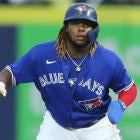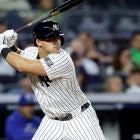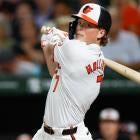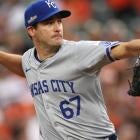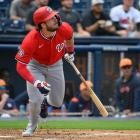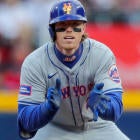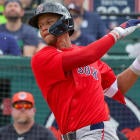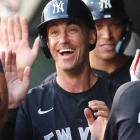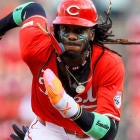
Fantasy Baseball has a problem. It's been brewing for several years but has finally been brought to boil.
That problem is stolen bases. When the pretend game first came to be, they were a major part of the real one. Now, not so much, and yet the way we score them hasn't changed to reflect it.
The result is an irrational preoccupation with them, to the point of making them the single most important quality a hitter can possess. Those who don't provide them can't be first-rounders -- it's practically a rule -- and if you look at the way ADP breaks down, it's like all hitters have been sorted into base-stealers and non base-stealers, with the latter only worth taking once the former are gone. How else do you explain Ozzie Albies going 40 spots ahead of Jose Altuve? The gap is nearly as big between Francisco Lindor and Carlos Correa and Randy Arozarena and Bryan Reynolds.
As a general rule, people will take the lesser hitter if he offers some stolen bases. And it doesn't even have to be that many. A mere 15 is enough to blind them from everything else.
This isn't the way things should be -- and I should mention that in some formats, like those that use points scoring rather than categories, it's not the way things are. But in standard 5x5 scoring, where stolen bases have such outsized importance, the connection to the real game has been lost. The reason steals have gone the way of the dinosaur, after all, is because research has shown that the risk generally isn't worth the reward. They're not as valuable as they were once believed to be, and they were never believed to be as valuable as home runs. Would you rather have one base or four? The choice is clear.
But when so many Fantasy Baseballers are making the exact opposite choice, the game is no longer the facsimile it was intended to be. It's less a GM simulation, however rudimentary, than a baseball-themed pick 'em. Hey guys, who can get the most stolen bases without completely tanking the rest of their offense?
Eh, who cares?
I've railed against this practice before, calling it stolen base derangement syndrome, but have ultimately gone along for the ride. It may not be the way things should be, I reasoned, but it's the way they are. And I am but a cog in a machine.
No more, I say. It ends here and now with a radical new approach much like the one that shook the Fantasy Football world out of its old habits a few years back, its shockwaves still being felt today.
That's right: It's time to go Zero-SB.
I know what you're thinking: Isn't that the same as "punting," a strategy as old as time that's also, incidentally, named for a football concept? The answer is no, it's not. Punting means resigning yourself to last place in a category, normally stolen bases, as a way of advantaging yourself in all the others. It's a high-risk move that deliberately limits your team's overall ceiling, and I was never much in favor of it. I'm still not.
But just like Zero-RB doesn't mean literally taking zeros at the RB spot, Zero-SB doesn't mean literally taking a zero in the SB category. I still intend to compete in stolen bases. I just don't think I need to try so hard to do it.
Never was this made more clear to me than in 2021, the Year of the Pitcher, a time when everybody had experienced enough of the juiced ball era to know what it meant. The standards for a home run had been lowered to a point that players of all shapes and sizes could accumulate them. They became so plentiful in all stages of the draft that you hardly even needed to try for them, allowing you instead to devote your draft capital to scarcer commodities like starting pitchers, yes, but also stolen bases. I bought in hard.
It didn't work. A big reason was because they changed the ball again, this time to one that didn't carry as well. Home runs went back to being most accessible to those who impacted the ball best, as had been true for most of baseball history, and an entire premise was blown to smithereens.
But amid the realization that I hadn't invested enough in home runs, that they weren't actually available in every corner of the draft (and on the waiver wire thereafter), came a revelation even more dire: I hadn't invested enough in anything.
Home runs don't happen in a silo. I mean ... they could if you hit the ball high enough, I guess, but my point is more a figurative one. Every home run contributes to three of the other four hitter categories in a standard 5x5 leagues. The batter is credited with a hit, which helps in batting average. He makes it all the way around the bases, which helps in runs. He drives in at least himself, and possibly more runners, which helps in RBI. It's true that not every home run hitter over the course of an entire season makes a positive contribution in all four categories, but the link between home runs and RBI is especially close. And if we're talking about an entire team rather than just one player, it's fair to say you're not going to contend in those other three categories if you're not also contending in home runs.
Stolen bases, on the other hand, are completely compartmentalized. They happen independently of everything else. Every stolen base brings the runner closer to scoring a run, I guess, but not every one results in a run. Most, in fact, don't, and the impact on batting average and RBI, not to mention home runs, is precisely nil.
Simple logic, then, suggests that if you're going to overdo it in one hitter category, it should be home runs, and if you're going to underdo it one, it should be stolen bases. So how have we gotten it backward?
There's another factor to consider here, and that's what exactly it means to overdo it and underdo it in each category. It's sort of an age-old Rotisserie adage that the goal is to "balance" your team's home runs and stolen bases, but of course, in the modern game, it's absurd to think you're going to achieve anything close to 1-to-1 ratio. This isn't the 1980s. Last year, there were 5,944 total home runs compared to 2,213 stolen bases, and that gap continues to widen with each passing decade.
Granted, everyone with even a casual interest in baseball knows this, but nuance is often lost in the urgency of a draft. With the clock winding down, you're liable to pair up every home run hitter with a base-stealer, as if they have an equal stake in the final outcome.
They don't, as we've already covered, and so the actual thought process should be this:
- When fewer bases are being stolen than ever, it doesn't take as many to keep pace in the category.
- When more home runs are being hit than ever, it takes a whole heaping buttload to keep pace in the category.
I've learned that when I start mentioning buttloads, people start asking for specifics, so here they are:
| Category averages by Roto ranking, 2021 | ||||||||
| | HR | SB | ||||||
1 | 345 | 149 | ||||||
2 | 328 | 132 | ||||||
3 | 316 | 122 | ||||||
4 | 307 | 114 | ||||||
5 | 299 | 108 | ||||||
6 | 290 | 102 | ||||||
7 | 283 | 96 | ||||||
8 | 275 | 91 | ||||||
9 | 266 | 85 | ||||||
10 | 256 | 79 | ||||||
11 | 242 | 72 | ||||||
12 | 220 | 60 | ||||||
This table, devised by colleague Chris Towers, depicts how many home runs or stolen bases it would have taken, on average, to place 1-12 in those categories last year, presuming a standard 12-team Rotisserie league. Clearly, it isn't a 1-to-1 ratio, but is it closer to 2-to-1, 3-to-1 or 4-to-1? Well, that depends on whether you're looking at the top, middle or bottom of the standings. It's a much steeper drop from first to eighth place in the stolen base category than it is in the home run category, which also speaks to what's required to keep pace in each. You actually have a much lower margin for error in home runs than in stolen bases.
I'll put it another way. Presuming you start 14 batters, as is standard in Rotisserie, you would have needed 10.6 stolen bases from each to place first in the category last year. In this environment, that's a lot, especially when you consider that your corner infielders and catchers -- a combined five of those 14 batters -- are unlikely to contribute even half of that. It's enough to make you pay up for anyone with the potential for 15 steals or more, as we're currently seeing.
But why even aim for first place if it's going to set you off course in everything else? You know how many stolen bases you would have needed from each of those 14 batters to place eighth in the category? A mere 6.5. Shoot, any player could stumble into six steals in a given year. That's one per month. It's the difference between trying and not trying, basically. Even Freddie Freeman manages to do it every year. You could go through an entire draft blissfully unaware that stolen bases were even a category and still come away with the 91 needed to place eighth in it.
That's what I'm trying to accomplish with the Zero-SB strategy. I'm of course keenly aware that stolen bases are a category, but I'm trying to tune them out, to be intentionally unintentional in my pursuit of them, recognizing that their abject scarcity makes a middle-of-the-category finish largely a matter of happenstance. It doesn't mean resigning myself to last place and one measly Rotisserie point, but I could live with eighth place and four Rotisserie points. And, you know, sixth place is only 11 steals more, which puts it within reach of the intentionally unintentional as well. Again, my aim in not aiming is to place in the middle of the category.
After all, you don't need to win every category to win the league -- you almost certainly won't, in fact -- and as we've already covered, the best category to shortchange is the one with no relation to any of the others.
As for home runs, you would have needed 24.6 from each of your 14 batters to place first in the category last year, which is a tall order even in a time when home runs are plentiful. But for you to finish eighth, those 14 hitters still would have needed to average 19.6, not exactly a small number itself. And again, a poor finish in that category could doom you in several others.
You can't afford to let up, in other words. Any departure from feeding the home run beast risks setting you back in the most important category. A Whit Merrifield in Round 3 or a Tommy Edman in Round 8 may seem like the best choice if you don't have a big base-stealer yet, but you'll have to make up for their lack of home runs elsewhere. That's easier said than done, especially since there aren't as many boppers available late in the draft anymore, like during the juiced ball era. There are some -- Hunter Renfroe, Jorge Soler and Adam Duvall, for instance -- but they're not all reserved for you.
Even a Trea Turner or Bo Bichette in Round 1 -- guys likely to come closer to 25 home runs than 35 -- could put you behind the eight ball. I'm not saying I wouldn't take them if the stars aligned for me to -- like, I'm not elevating Rafael Devers over them just because he doesn't steal bases -- but would I take Vladimir Guerrero over them? Absolutely.
And it's worth pointing out that all the big base-stealers going in Rounds 1 and 2 are good-to-excellent power hitters, so being intentionally unintentional about stolen bases doesn't necessarily mean passing them over. You're there for the hitting stats, but you can't help that they also happen to run. The last of these players is probably Cedric Mullins, who tends to make it to the middle of Round 3, which gives you as many as three chances to secure an early stolen base advantage without being intentional about it. And if you do, that eighth-place finish is already in your grasp.
It certainly isn't necessary, though. In the normal process of filling out your roster, you're liable to grab a Javier Baez here, a Jonathan India there, a Dansby Swanson, an Adolis Garcia, an Avisail Garcia and, well, you get the idea. Here's an example of a team built much this way from a recent mock draft of ours:
C - Mike Zunino (Round 19)
C - Eric Haase (23)
1B - Freddie Freeman (2)
2B - Jonathan India (9)
3B - Austin Riley (4)
SS - Javier Baez (8)
MI - Brendan Rodgers (17)
CI - Pete Alonso (5)
OF - Mike Trout (1)
OF - Kyle Schwarber (10)
OF - Chris Taylor (11)
OF - Robbie Grossman (12)
OF - Marcell Ozuna (18)
U - Nicky Lopez (20)
P - Sandy Alcantara (3)
P - Charlie Morton (6)
P - Frankie Montas (7)
P - Craig Kimbrel (13)
P - Framber Valdez (14)
P - Adam Wainwright (15)
P - Camilo Doval (16)
P - Scott Barlow (21)
P - Zack Greinke (22)
This group actually would have combined for 101 stolen bases last year, 10 more than the 91 I'm looking for, which goes to show you how light of a lift it is. I did cheat a little with the Nicky Lopez pick. He's the one base-stealer I might be somewhat intentional about drafting, particularly if I didn't happen into one of those early-round category-stuffers. He goes so late, being drafted around Pick 240 on average, that there aren't any reliable home runs sources left anyway. Lopez seems like a safe bet for 25-30 steals and a pretty safe bet to hit .300, so for the price, he seems like a worthy departure.
But he's alone in that regard. The goal of the Zero-SB strategy is to draft your home runs on purpose and your stolen bases by accident. Both the data and my own experience suggest it's the most efficient approach to take with each.
![[object Object] Logo](https://sportshub.cbsistatic.com/i/2020/04/22/e9ceb731-8b3f-4c60-98fe-090ab66a2997/screen-shot-2020-04-22-at-11-04-56-am.png)







